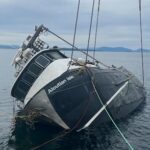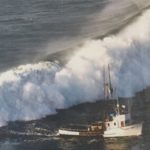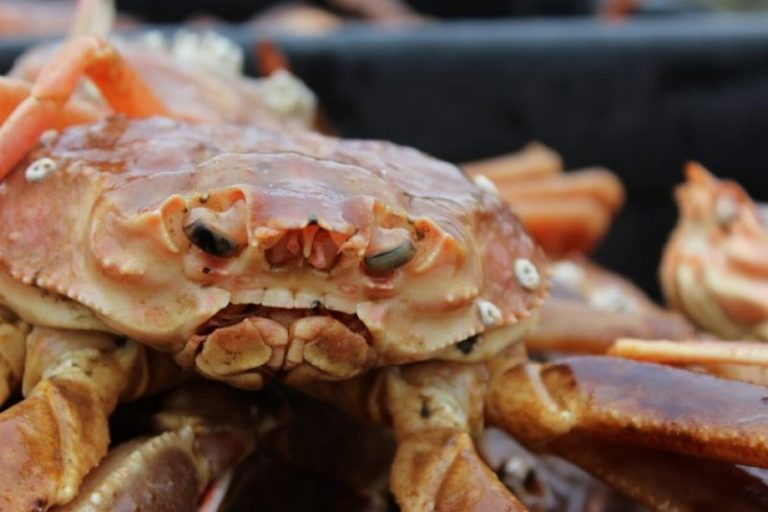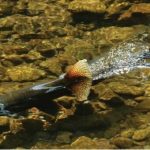Tag Archives: On this day
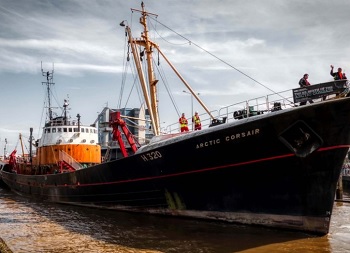
On This Day: The Arctic Corsair was launched 60 years today
Today marks the 60th birthday of one of Hull’s most high-profile pieces of maritime heritage. On Monday, February 29, 1960 the newly-built Arctic Corsair trawler was launched sidewards into the River Hull at the Beverley shipyard of Coo, Welton and Gemmell Ltd. The sidewinder trawler was the latest addition to a fleet of vessels owned by Hull fishing firm Boyd Line. Like all new trawlers, the Corsair wasn’t immediately ready for a trip to the Arctic fishing grounds. Instead, she underwent an extensive fitting out operation in Princes Dock in Hull before embarking on her maiden voyage on June 18. Video, >click to read< 14:52
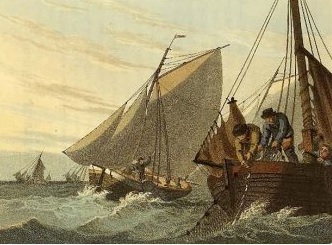
September 28 – 1889: Cape fishermen heading for South Africa for mackerel
“Fishing widow” will now become a year-round occupation. A century ago the fishermen on Cape Cod were making plans to spend the winter fishing for mackerel off the Cape of Good Hope off the southern tip of Africa, a distance of almost 8,000 miles away from homeport. For the wives of the Cape’s fishermen that would mean nearly year-round widowhood as the trip a century ago took weeks under the best of conditions and mackerel were believed to abound in South African waters after December 1st, the same fish seen here six months later. >click to read< 14:08
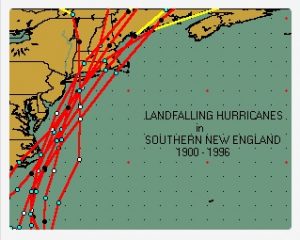
On This Day: September 20,1938 The ‘wind that shook the world’ kills 700, and nobody saw it coming
The hurricane of 1938 has been called, “the wind that shook the world”. In 1938 the U.S. Weather Bureau wasn’t what it is today . Meteorologists depended on the merchant ships and aircraft to forecast the weather. At 2:15 on Wednesday, September 21 1938 a Long Island fisherman saw what he thought was a huge fog bank, then, he realized it wasn’t fog. It was a churning wall of water 50 feet high bearing down on the New England coast and thirteen million unsuspecting people, with 200 miles per hour winds. >click to read< 07:44
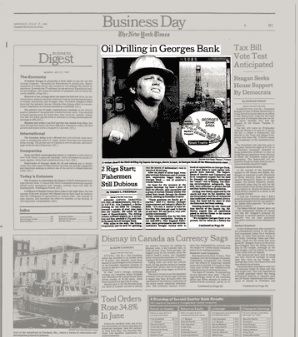
July 27, 1981: Oil drilling begins off Cape Cod: ”It’s only a matter of time before the fishermen get used to having us out here.
After six years of bitter legal wrangles between fishermen and oil companies, exploration began today on Georges Bank – one of America’s richest fisheries. At the Zapata Saratoga rig were a knot of Shell Oil officials, nine journalists and a group of curious finback whales who poked their heads through the distant waves, sending up fountains of spray. ‘Thank goodness we finally got it started,” said O.J. Shirley, manager of government and industry affairs for Shell. ”It’s only a matter of time before the fishermen get used to having us out here. We can have a very compatible relationship.” >click to read< 08:28
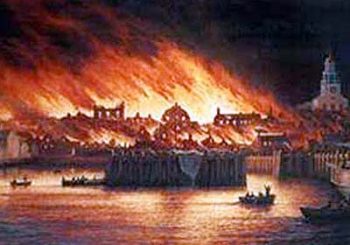
On this Day: July 13 – 1846: Burning whale oil created “a sea of fire” nearly wipes out Nantucket
On this day in 1846, a fire began in a hat store on Nantucket’s Main Street. In no time, it raced through town, consuming everything in its path. Barrels of whale oil were stored on the wharves; when the fire reached them, they burst into flames. The burning oil flowed into the water, creating what one man described as “a sea of fire.” Seven hours later most of the town’s commercial area lay in ashes. Some 250 buildings had been destroyed – almost all the markets and shops, seven factories that processed whale oil, a dozen warehouses, three of the town’s four wharves, and many homes. The fire had lasting consequences: it contributed to the demise of Nantucket as the world capital of the whaling industry. >click to read< 09:10
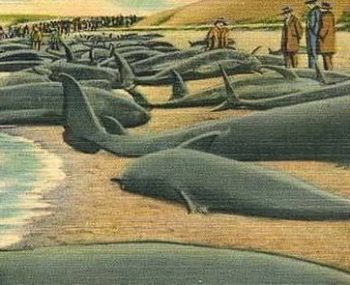
On This Day in 1958: Fifty whales stranded on Cape Cod
The United Press International wire story began; Tides Strand 50 Whales Off Cape Cod Island WELLFLEET, Mass., July 5 (UPI) — Tides of the Atlantic Ocean that refloated some 100 small whales brought more than half of them back again today… Townsfolk, aware of the problem of removing dead (and very smelly) whales from the sand bars, were joyful when an early morning tide washed most of the mammals free. But the joy was short-lived. The afternoon tide brought about sixty of the whales back onto the shore. >click to read< 08:06
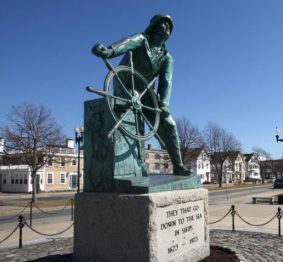
On This Day, 1952: CRASH SINKS BOAT; HERO CAPTAIN LOST; Skipper Leaps Into Sea Lest He Crowd Dory After Trawler, Tanker Collide
CRASH SINKS BOAT; HERO CAPTAIN LOST; Skipper Leaps Into Sea Lest He Crowd Dory After Trawler, Tanker Collide — 12 Saved – Special to THE NEW YORK TIMES. June 21, 1952, Saturday BOSTON, June 21 — The 100-foot Gloucester fishing trawler Albatross and the 10,000-ton tanker Esso Chattanooga collided early today off Provincetown, Mass. The captain of the trawler was lost… The captain’s wife reported he had joked about taking his vessel out on Friday the 13th… >click to read<08:40
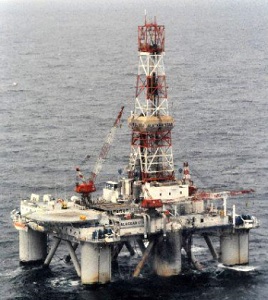
July 27, 1981: Oil drilling begins on Georges Bank – ”It’s only a matter of time before the fishermen get used to having us out here.”
On this day in 1981, the New York Times reported on the start of drilling for oil in Georges Bank. It was not to be, however, as the first President George Bush later proclaimed a federal edict which prohibited all offshore oil exploration, at least until today when his son has rescinded that presidential edict. Eight exploratory wells were dug to average depths of 16,000 feet about 125 miles east of Cape Cod through early 1982. At 4:57 P.M., Wes Campbell, a driller working for the Shell Oil Company, lowered a column of steel pipe deep into the Atlantic, 200 miles off the coast of Massachusetts. >click to read<08:14
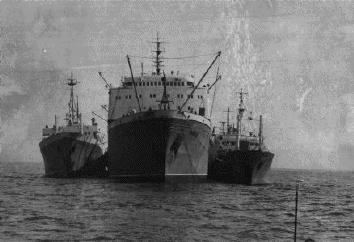
On This Day – March 1, 1977: 200-mile fishing zone takes effect
On this day in 1977, a 200-mile territorial fishing zone took effect, with the waters off Cape Cod being one of the two areas where the Coast Guard focused its enforcement efforts. Coast Guard vessels also patrolled the rich fishing grounds near Kodiak, Alaska, to protect American fishermen from foreign competition. “Poachers illegally fishing U.S. waters or taking the wrong kind of fish can be seized,” United Press International reported. Foreign vessels were required to obtain permits to fish within 200 miles of the US coastline,,, >click to read<09:22
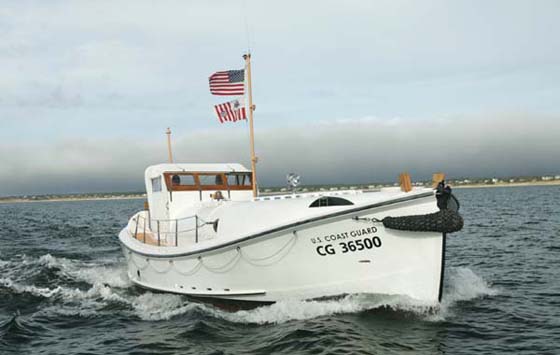
On This Day: February 18 – 1952: Coast Guard rescues 32 sailors from stricken tanker Pendleton
On this day in 1952, one of the most daring rescues in the history of the Coast Guard took place six miles off Chatham. The tanker Pendleton, en route to Boston from Baton Rouge with a cargo of oil, split in two during the winter’s worst storm. Eight crew members were trapped on the ship’s bow; another 33 sailors were stranded on the Pendleton’s stern. And in 1875: Twenty-four Cape Cod fisherman lost as two schooners fail to return from Grand Banks >click to read< 08:52
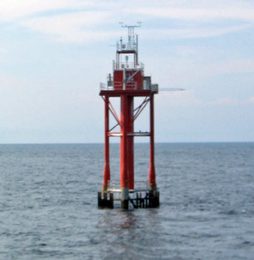
On This Day: January 8, 1999, Fishing boat Cape Fear sinks in Buzzards Bay
On this day in 1999, the 112-foot fishing boat Cape Fear sank a quarter mile from the light tower at the mouth of Buzzards Bay. Its captain and two crew members were rescued by the vessel’s sister ship, the Misty Dawn, but two other crew were presumed drowned in the frigid, 37-degree waters. click here to read the story What happened? Report details cause of Cape Fear sinking – An investigation into the sinking of the Cape Fear two years ago has concluded,,, click here to read the story 10:07
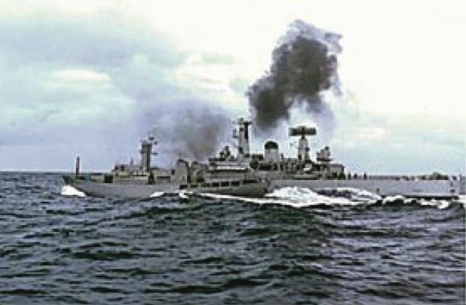
On This Day: Dec. 11, 1975 – Attack on British vessels heightens Cod War
An Icelandic gunboat has opened fire on unarmed British fishery support vessels in the North Atlantic Sea, it is reported. The violent clash left the Icelandic coastguard ship, Thor, badly damaged but the three British vessels involved appear to be unaffected. The Thor is said to have tried to arrest the British Star Aquarius and her sister vessel the Star Polaris as they sheltered from a force nine gale within Iceland’s 12 mile territorial waters. click here to read the story 09:03
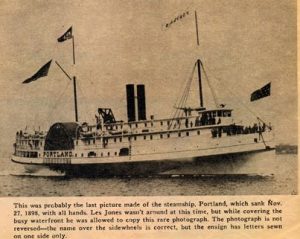
On This Day: November 26 – 1898: Killer gale sinks SS Portland, 100 die
The recorded maritime history of the East Coast details many storms with high incidences of vessels and people lost. Killer gales were recorded in 1839, 1851, 1873 and 1886. But none was to compare with the great hurricane of November 26 to 28, 1898. This storm is commonly referred to as the Portland Gale, after the steamer Portland, which was lost at sea with all hands.,, The storm wrecked more ships than any other in the history of New England. It is estimated that over 150 vessels were lost, both in the harbors and at sea. Many were never heard from after sailing. click here to read the story 09:43
On This Day – October 8 – 1984: Ninety-four whales die after beaching in Eastham
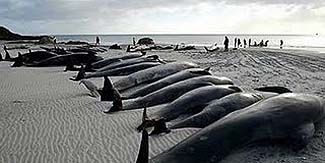 On this day in 1984, workers from the New England Aquarium began giving lethal injections to beached pilot whales that could not be saved. Ninety-four whales, some 20 feet long, were stranded Saturday on a beach in Eastham. The cause of the mass beaching, the largest in the Cape Cod area in recent years, is not known. Mass strandings of dolphins, whales, and other marine mammals date back to the time of Aristotle, but some environmental activists,,, click here to read the story 09:27
On this day in 1984, workers from the New England Aquarium began giving lethal injections to beached pilot whales that could not be saved. Ninety-four whales, some 20 feet long, were stranded Saturday on a beach in Eastham. The cause of the mass beaching, the largest in the Cape Cod area in recent years, is not known. Mass strandings of dolphins, whales, and other marine mammals date back to the time of Aristotle, but some environmental activists,,, click here to read the story 09:27
On This Day – September 28, 1889: Cape fishermen heading for South Africa for mackerel
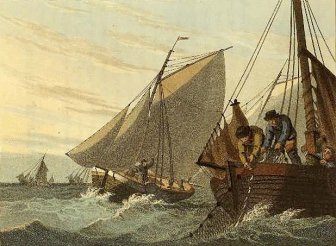 A century ago the fishermen on Cape Cod were making plans to spend the winter fishing for mackerel off the Cape of Good Hope off the southern tip of Africa, a distance of almost 8,000 miles away from homeport. For the wives of the Cape’s fishermen that would mean nearly year-round widowhood as the trip a century ago took weeks under the best of conditions and mackerel were believed to abound in South African waters after December 1st, the same fish seen here six months later. The Cape Cod schooners will salt the mackerel and return to Provincetown to sell their catch. The reprint of the story in The New York Times from a century ago is below. click here to read the story 08:18
A century ago the fishermen on Cape Cod were making plans to spend the winter fishing for mackerel off the Cape of Good Hope off the southern tip of Africa, a distance of almost 8,000 miles away from homeport. For the wives of the Cape’s fishermen that would mean nearly year-round widowhood as the trip a century ago took weeks under the best of conditions and mackerel were believed to abound in South African waters after December 1st, the same fish seen here six months later. The Cape Cod schooners will salt the mackerel and return to Provincetown to sell their catch. The reprint of the story in The New York Times from a century ago is below. click here to read the story 08:18
Wondering about the success of this venture? click here to read a bit more about it! pg. 196
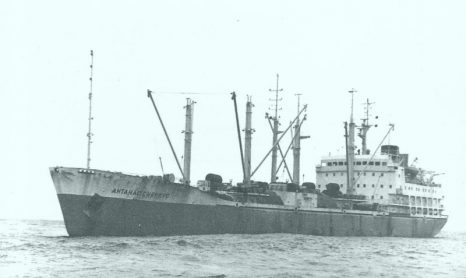
On this Day: April 12,1977: “Mother ship of the Russian fishing fleet” seized by Coast Guard off Nantucket
On this day in 1977, a so-called “mother ship of the Russian fishing fleet” off New England was taken to Boston to join another Soviet vessel under guard at the Boston Coast Guard Station for suspicion of violating the new US 200-mile fishing limit. The 503-foot refrigerator-transport vessel Antanas Snechkus (shown below) was seized 100 miles southeast of Nantucket with 100 tons of fish believed to have been caught illegally under the new limit, which took effect March 1, 1977. A day before the Antanas Snechkus was seized, the Coast Guard boarded the 275-foot Russian trawler Taras Shevchenko about 240 miles southeast of Boston and 75 miles inside the limit under direct orders from President Jimmy Carter. click here to read the story 06:33
On this Day in 1977: 200-mile fishing zone takes effect
 On this day in 1977, a 200-mile territorial fishing zone took effect, with the waters off Cape Cod being one of the two areas where the Coast Guard focused its enforcement efforts. Coast Guard vessels also patrolled the rich fishing grounds near Kodiak, Alaska, to protect American fishermen from foreign competition. “Poachers illegally fishing U.S. waters or taking the wrong kind of fish can be seized,” United Press International reported. Foreign vessels were required to obtain permits to fish within 200 miles of the US coastline, while some coastal areas and species of fish were deemed off-limits altogether. The federal government warned other nations that Coast Guard patrol boats would not hesitate to board foreign fishing boats within the 200-mile limit to ensure compliance. scroll down the page to read the rest of the story here 08:29
On this day in 1977, a 200-mile territorial fishing zone took effect, with the waters off Cape Cod being one of the two areas where the Coast Guard focused its enforcement efforts. Coast Guard vessels also patrolled the rich fishing grounds near Kodiak, Alaska, to protect American fishermen from foreign competition. “Poachers illegally fishing U.S. waters or taking the wrong kind of fish can be seized,” United Press International reported. Foreign vessels were required to obtain permits to fish within 200 miles of the US coastline, while some coastal areas and species of fish were deemed off-limits altogether. The federal government warned other nations that Coast Guard patrol boats would not hesitate to board foreign fishing boats within the 200-mile limit to ensure compliance. scroll down the page to read the rest of the story here 08:29
On This Day, 2006: Coast Guard tows disabled Lady of Grace to port
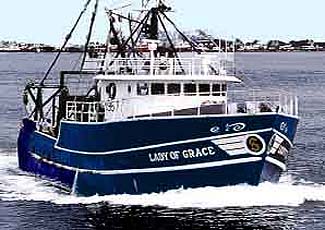 On this day in 2006 the Coast Guard towed a 76-foot fishing vessel to safety after the vessel became disabled near Nantucket early Monday morning. The Lady of Grace with four crew members on board, contacted the Coast Guard Sector Southeastern New England Command Center at 3:34 a.m. and reported they were without power and drifting approximately 10 miles east of Great Point, Nantucket. A rescue boat crew from Coast Guard Station Brant Point on Nantucket launched a 47-foot motor life boat to take the vessel in tow. Almost exactly a year later, on January 27, 2007, the Coast Guard launched a massive search for the fishing boat Lady of Grace after the 75-foot dragger failed to return as scheduled to New Bedford.1922: Weird January hurricane hits Cape, Read the rest here 16:23
On this day in 2006 the Coast Guard towed a 76-foot fishing vessel to safety after the vessel became disabled near Nantucket early Monday morning. The Lady of Grace with four crew members on board, contacted the Coast Guard Sector Southeastern New England Command Center at 3:34 a.m. and reported they were without power and drifting approximately 10 miles east of Great Point, Nantucket. A rescue boat crew from Coast Guard Station Brant Point on Nantucket launched a 47-foot motor life boat to take the vessel in tow. Almost exactly a year later, on January 27, 2007, the Coast Guard launched a massive search for the fishing boat Lady of Grace after the 75-foot dragger failed to return as scheduled to New Bedford.1922: Weird January hurricane hits Cape, Read the rest here 16:23
On this Day: June 30 – 1911: Coastal Steamer Nacoochee Runs Down Fishing Schooner Off Cape Cod.
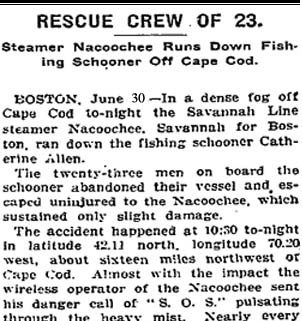 On this day in 1911 one of the many coastal steamers of the era sank a large fishing schooner 16 miles northwest of Provincetown. Since the canal was not completed yet, all ships had to sail a round the outer shore of Cape Cod, and the area was also rife with commercial fishing boats. The headline in the newspapers the next day blared: RESCUE CREW OF 23.; Steamer Nacoochee Runs Down Fishing Schooner Off Cape Cod. BOSTON, June 30. — In a dense fog off Cape Cod to-night the Savannah Line steamer Nacoochee, Savannah for Boston ran down the fishing schooner Catherine Allen… (Read the rest on the right.) Read the rest here 14:20
On this day in 1911 one of the many coastal steamers of the era sank a large fishing schooner 16 miles northwest of Provincetown. Since the canal was not completed yet, all ships had to sail a round the outer shore of Cape Cod, and the area was also rife with commercial fishing boats. The headline in the newspapers the next day blared: RESCUE CREW OF 23.; Steamer Nacoochee Runs Down Fishing Schooner Off Cape Cod. BOSTON, June 30. — In a dense fog off Cape Cod to-night the Savannah Line steamer Nacoochee, Savannah for Boston ran down the fishing schooner Catherine Allen… (Read the rest on the right.) Read the rest here 14:20
On this day, January 11, 2006: Lady of Grace rescued a year before she sank
 January 11, 2006: Coast Guard tows disabled Lady of Grace to port Rescued 10 miles east of Great Point, Nantucket, a year later she was sunk On this day in 2006 the Coast Guard towed a 76-foot fishing vessel to safety after the vessel became disabled near Nantucket early Monday morning. The Lady of Grace with four crew members on board, contacted the Coast Guard Sector Southeastern New England Command Center at 3:34 a.m. and reported they were without power and drifting approximately 10 miles east of Great Point, Nantucket. Read the post here 14:41
January 11, 2006: Coast Guard tows disabled Lady of Grace to port Rescued 10 miles east of Great Point, Nantucket, a year later she was sunk On this day in 2006 the Coast Guard towed a 76-foot fishing vessel to safety after the vessel became disabled near Nantucket early Monday morning. The Lady of Grace with four crew members on board, contacted the Coast Guard Sector Southeastern New England Command Center at 3:34 a.m. and reported they were without power and drifting approximately 10 miles east of Great Point, Nantucket. Read the post here 14:41


































